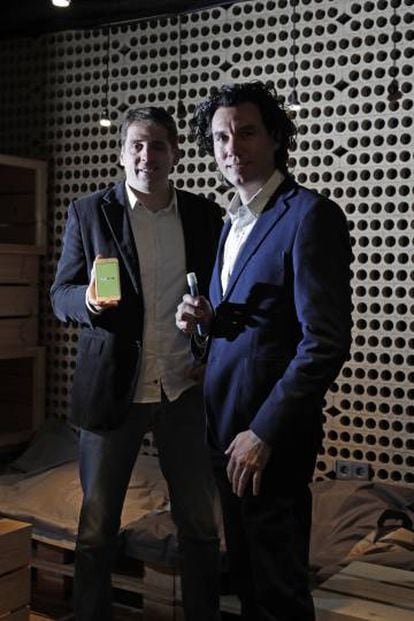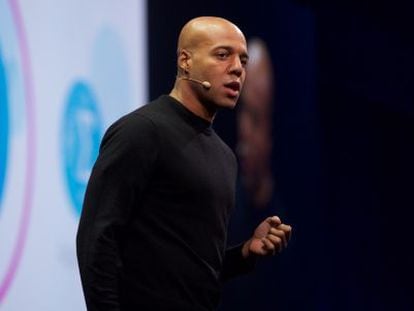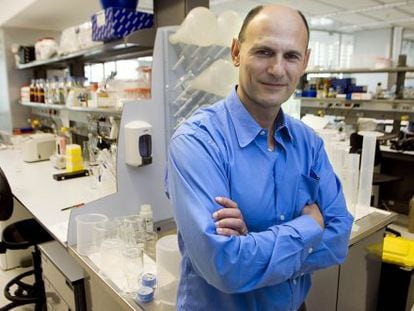Spanish startup provides a high-tech solution for diabetics
Insulclock monitors insulin dosage as well as providing invaluable patient data
A Madrid-based startup has created a ground-breaking solution for diabetics due to be launched in September of this year. Jesús Arenas Latorre and José Luis López are the founders of Insulclock, a cloud-connected electronic device that attaches to an insulin pen, recording and processing treatment administration data and sending it to a smartphone to generate reports, establish alerts and provide a record of insulation administration.

Insulclock not only reminds people when their next insulin dose is needed, but can also send information to doctors, family members, or carers. The prize-winning project, set up in 2014 with a team of 18 people, now has the support of companies in the health sector, as well as other public and private bodies in Spain.
“The main problem diabetics face in dealing with the illness is constancy,” says López. “Each day you have to carry out exhaustive monitoring of your habits and dosage, a routine that falls out of sync in 68% of cases, because people don’t commit to it,” he adds.
Insulclock is not an insulin pump, nor is it a plaster to measure glucose levels, explains Arenas. “What it does is monitor the amount of insulin you have given yourself and it then tells you the type, the time, and the dose,” he explains.
All data obtained is encrypted “in an independent server under strict security measures, because in Spain the law is very tough in this regard,” he adds. Patients can also opt to not have their information stored remotely.
López understands the importance of proper treatment: he is diabetic
Aside from helping diabetics better control their condition, Arenas and López say the information acquired, with the appropriate data protection, will be of interest to insurance companies, hospitals, public health authorities, and private companies in the health sector.
The pair add that their model, which has been patented in Spain and the United States, has many applications including the treatment of respiratory diseases and fertility problems, or the regulation of the use of growth hormones or for the treatment of patients with chronic illnesses
The project has been backed by the European Commission’s Horizon 2020 initiative, which has just provided just over €1 million of a current budget of €1.4 million, while the Spanish industry ministry’s Neotec program has contributed €211,000.
All data obtained using Insulclock is encrypted in an independent server under strict security measures
Arenas says that aside from its insulin monitoring device, the startup intends to focus on commercializing the research and development work it has already carried out. It will be focusing on pharmaceutical companies, insurance companies, geriatric care homes, and large hospitals. “We can provide solutions to their telemedicine issues – to problems created by not accurately following treatment,” says Arenas.
Once the device is approved by the Spanish health authorities, the idea is to “generate revenue of €300 million a year and reach 1% profitability in the first year.” The device will likely cost €249 and Insulclock is confident it will be financed by the state health system. “We have already worked with a number of hospitals, including the Fundación Jiménez Díaz in Madrid, where four endocrinologists have been advising us over the course of the project,” says López, adding: “Monitoring treatments will save millions for the organization, because the data is so precise.”
The main problem diabetics face in dealing with the illness is constancy José Luis López, Insulclock co-founder
The World Health Organization says that one in 11 people around the globe now suffers from diabetes, and the number is growing: it says that by 2030, some 640 million people will need to take insulin several times a day. López understands both the scale of the problem, and the importance of proper treatment: he is diabetic.
“I never thought of this as something to make myself rich from, but as a necessity from my own experience. I understand the needs of diabetics, they are largely overlooked, and they are dependent on keeping count of what they eat, the dose they must inject… monitoring this information is very tiring, so people tend to do it quickly and badly and doctors don’t keep an eye on it. And that is bad for everybody.”
English version by Nick Lyne.












































